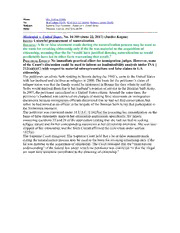
Supreme Court Published - Maslenjak v. United States PDF
Preview Supreme Court Published - Maslenjak v. United States
From: Vick, Lindsay (EOIR) To: All of Judges (EOIR); All of OCIJ JLC (EOIR); McHenry, James (EOIR) Subject: Supreme Court Published - Maslenjak v. United States Date: Thursday, June 22, 2017 6:41:59 PM Maslenjak v. United States, No. 16-309 (June 22, 2017) (Justice Kagan) ISSUES: Unlawful procurement of naturalization HOLDING: A lie or false statement made during the naturalization process may be used as the basis for revoking citizenship only if the lie was material to the acquisition of citizenship, meaning that the lie “would have justified denying naturalization or would predictably have led to other facts warranting that result.” PRACTICAL EFFECT: No immediate practical effect for immigration judges. However, some of the Court’s discussion could be used to inform an inadmissibility analysis under INA § 212(a)(6)(C) with respect to material misrepresentations and false claims to U.S. citizenship. The petitioner, an ethnic Serb residing in Bosnia during the 1990’s, came to the United States with her husband and children as refugees in 2000. The basis for the petitioner’s claim of refugee status was that the family would be mistreated in Bosnia for their ethnicity and the Serbs would mistreat them due to her husband’s evasion of service in the Bosnian Serb Army. In 2007, the petitioner naturalized as a United States citizen. Around the same time, the petitioner’s husband was convicted on charges of making false statements on immigration documents because immigration officials discovered that he had not fled conscription, but rather he had served as an officer in the brigade of the Bosnian Serb Army that participated in the Srebrenica massacre. The petitioner was convicted under 18 U.S.C. § 1425(a) for procuring her naturalization on the basis of false statements made in her citizenship application; specifically, for falsely answering questions 23 and 24 of the application (stating that she had not lied in seeking refugee status) and for her corresponding statements at her citizenship interview. She was later stripped of her citizenship, and the Sixth Circuit affirmed the conviction under section 1425(a). The Supreme Court disagreed. The Supreme Court held that a lie or false statement made during the naturalization process may be used as the basis for revoking citizenship only if the lie was material to the acquisition of citizenship. The Court reasoned that the “most natural understanding” of the federal law under which the petitioner was convicted “is that the illegal act must have somehow contributed to the obtaining of citizenship.”
